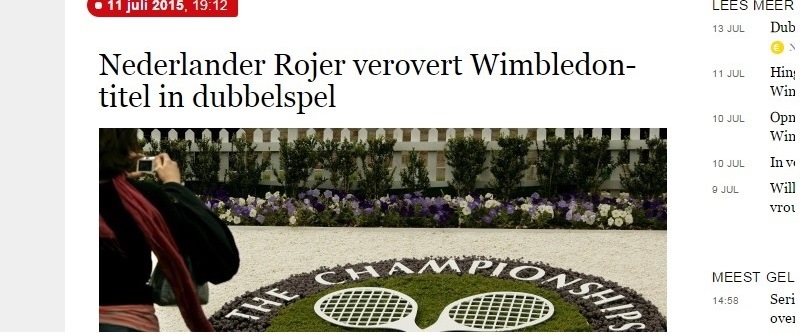
24 Jul To be or not be (called) Dutch… (blog by Stacey Mac Donald)
To be or not be (called) Dutch: is that the question…? The media can’t have it both ways: we are Dutch, or we are not. It is a fact that in times of failure, the media writes about the ‘Curaçaoan’ that lost, the ‘Antillean’ or even worse, the ‘allochtoon’[1] that committed a crime. But when these ‘foreigners’ do something positive, all of a sudden they are Dutch?
A week ago, the Curaçaoan Jean-Julien Rojer won the Wimbledon men’s doubles final. In the Dutch media, the victory made the news: ‘ Dutch double specialist Rojer wins Wimbledon ‘.- NRC and ‘Dutch tennis player for the first time in finals. First for Rojer at Wimbledon ‘ ‘- Telegraaf. A Dutchman, so it seems.
That same weekend, the famous sprinter, Churandy Martina, lost the 100 meter sprint in Madrid. In these articles it was not mentioned once that Churandy is Dutch, even though he represents the Netherlands as well. That weekend, Martina was the the sprinter of Curaçao who ran a ‘disappointing’ final and lost. Two weeks earlier, however, when Churandy qualified for the World Cup he was Dutch. Another example: last year when Churandy got through to the finals in Moscow, he was Dutch. The next day Martina lost the race and he became, you guessed it, the athlete of Curacao. A pattern is clearly visible. And I haven’t even mentioned all the baseball players, football players and swimmer Enith Brigitha yet.
That the athletes are being called ‘Dutch’ isn’t wrong. They have the Dutch nationality after all and they represent the Netherlands. Also, the remainder of the articles in the Dutch press about Jean-Julien Rojer do mention that the tennis player is from Curaçao. But I’m referring to the title of the article that reaches largest audience. The immigrant who suddenly becomes a Dutchman. The term ‘gelegenheids-Nederlander’, literally translated as ‘occasional-Dutchman’ is used to describe this ongoing and frustrating phenomenon.
The former Netherlands Antilles are currently going through a new process. The islands are in search of their own identity. With the closer integration of Saba, St. Eustatius and Bonaire in the Netherlands not only the islanders, but all Dutch people are dealing with an identity shift. Who exactly is a ‘Dutchman’, and who isn’t? Rather than asking who, is seems as though the media is asking when, under what circumstances, a person is considered to be Dutch. Only when he or she books success, but not in times of failure? This phenomenon isn’t unique for the Dutch, but the complexity is clearly reflected in her media.
Recently the Volkskrant, had a debate in on the abolition of the word ‘allochtoon’. For years the media has been selective, inconsequent and misleading when referring to ethnic qualifications. One of the editors of the Volkskrant made the accurate statement that ‘words aren’t innocent. It matters how we call each other in a diverse, multi-ethnic society’. And his words resonate with many, not only the Dutch Caribbean community. This is a debate that should be held in each editorial in the Netherlands. If it is that necessary to point out a Curaçaoan commits a crime, then at the least, let the talented, successful Curaçaoan be mentioned as a Curaçaoan as well.
And this time making the headlines.
[1] In the Netherlands, the term allochtoon is widely used to refer to immigrants and their descendants. Officially the term allochtoon is much more specific and refers to anyone who had at least one parent born outside the Netherlands (CBS). In everyday life however, it’s common that when referring to a “Dutch” person, people usually refer to the ethnic Dutch excluding Dutch citizens with different ethnic backgrounds.




No Comments